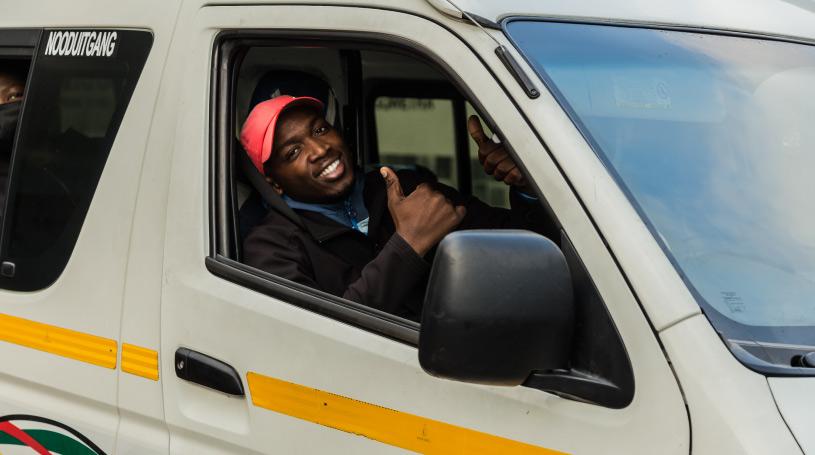Taxi breakthrough as top companies and taxi stakeholders join forces in Western Cape business initiative
Taxi Cluster set to bolster taxi compliance, passenger safety, and crime prevention.
The taxi industry has partnered with key Western Cape business stakeholders in a major public transport initiative set to benefit both taxis and their passengers.
The initiative, spearheaded by the Cape Chamber of Commerce & Industry and the country’s largest taxi association, SANTACO, features a new Taxi Cluster able to facilitate industry self-regulation and cost reductions for qualifying taxi owners. If successful it would help resolve many of the current taxi challenges such as road safety and legal compliance.
The new Taxi Cluster also incorporates a major crime prevention project whereby taxi drivers can report incidents of crime and suspicious behaviour using a cell phone app.
The primary objective of the Taxi Cluster is to reform the taxi industry via active stakeholder collaboration. It sees the taxi industry joining forces with corporate heavyweights like Vodacom, MTN, Standard Bank, and others. Qualifying taxi owners will now have access to a range of cost benefits, including more affordable vehicle loan finance made possible by better regulatory compliance and vehicle tracking systems.
Another key objective is to promote smarter business models that translate into improved driver behaviour and increased profitability for taxi owners, with a knock-on positive spin-off for passenger safety and that of other road users.
The initiative builds on the success of a previous taxi initiative, the Western Cape Government Blue Dot Taxi Programme, which was discontinued despite initial success due to unsustainable cost. But unlike the Blue Dot Programme the new Taxi Cluster system will provide the required taxi services with financially viable and sustainable business solutions.
Other Cluster members include fuel suppliers and retail motor companies able to benefit from the economy of scale the cluster provides. The potential number of eligible taxi owners creates an economically viable market demand. “Using technology and smart collaboration between stakeholders, this breakthrough self-sustainable model has rapid scalability and the capacity to financially support itself to ensure longevity,” says Cape Chamber Deputy President Derryn Brigg who drew up the detailed cluster concept plan. “Central to the concept is using various technologies to track and improve taxi driver behaviour and taxi business operations which result in taxi businesses becoming more profitable and sustainable through built-in benefits. Some of these benefits include reducing revenue losses and lowering the operating costs such as finance, insurance and maintenance,” Brigg says.
In effect the Taxi Cluster allows diverse stakeholders to pool resources. The taxi industry will have access to the Cape Chamber’s professional negotiators available to help them secure favourable vehicle-related deals.
Taxi Cluster stakeholders are already in talks with Business Against Crime (BAC) to implement their Eyes & Ears Programme throughout the taxi network using BAC’s technology and infrastructure. Taxi alerts elicit a response from law enforcement. In this way the Cluster could instantly mobilise a 16 000-strong taxi fleet traversing Western Cape roads to act as the eyes and ears for crime prevention, “The sheer size and nature of the industry affords them the capacity to provide much larger geographical coverage and operational support to the South African Police Services and private security companies – something we desperately need as crime affects us all,” Brigg says. “The key to the success of this taxi cluster lies in bringing together the right partners who can cooperate, collaborate, and work smarter to effect positive change that will not only benefit all the stakeholders involved, but society in general. ”The privately-run taxi industry is a vital component of the Western Cape economy, transporting 70% of public transport users without any government subsidies.
SANTACO Western Cape provincial secretary Mandla Hermanus said the Taxi Cluster could be a game-changer for public transport, creating a partnership model of immediate benefit to both the private and public sector: “A key element of this is the ability to brand and track our taxis. It ensures that when our commuters get onto the taxis, they are legitimate taxis. We will be able to track and monitor the behaviour of our drivers, which has huge benefits for the community in terms of safety, and huge benefits for taxi operators because driving behaviour will change if it is monitored. This means the incidents of bad driving will be reduced,” Hermanus says.
Brigg believes the Taxi Cluster signals a new era of partnership and positive engagement in the best interests of the broader community. “This should be a win-win situation for all concerned through safer roads, fuelled by collaborative, more efficient, and smarter business models.”
Jacques Moolman
President of the Cape Chamber of Commerce and Industry
YouTube video
Credit: Newzroom Afrika
Santaco accuses metro of impounding taxis to generate revenue

